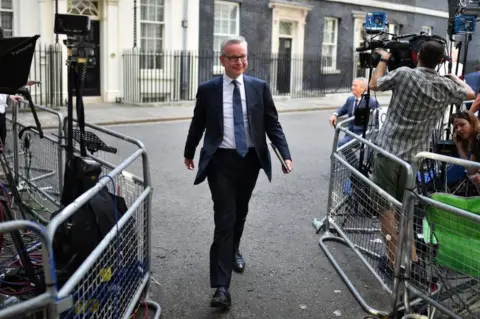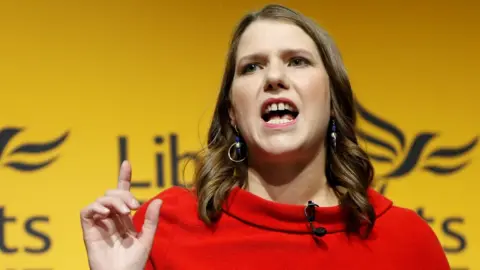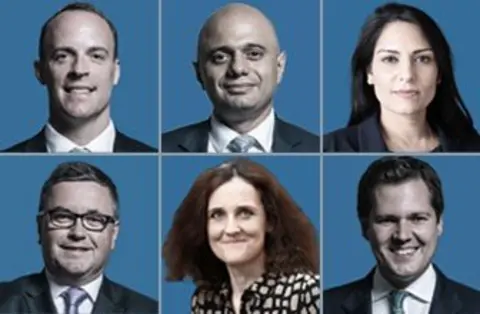No-deal Brexit now 'assumed' by government, says Gove (original) (raw)

 Getty Images
Getty Images
Michael Gove, the newly appointed chancellor of the Duchy of Lancaster, is in charge of preparing for a no-deal Brexit
The government is now "working on the assumption" of a no-deal Brexit, Michael Gove has said.
Mr Gove said his team still aimed to come to an agreement with Brussels but, writing in the Sunday Times, he added: "No deal is now a very real prospect."
Treasury sources say they expect more than £1bn of extra funding to be made available later this week for no-deal planning and preparation.
Writing in the Sunday Telegraph, Chancellor Sajid Javid said there would be "significant extra funding" for 500 new Border Force officers and "possible" improved infrastructure at British ports.
Prime Minister Boris Johnson has told Mr Gove to chair no-deal meetings seven days a week until Brexit is delivered, according to the Sunday Times.
Mr Gove said tweaks to Theresa May's withdrawal agreement - which was approved by the EU but resoundingly rejected by Parliament - would not be enough.
"You can't just reheat the dish that's been sent back and expect that will make it more palatable," he wrote.
He added he hoped EU leaders might yet open up to the idea of striking a new deal, "but we must operate on the assumption that they will not".
"While we are optimistic about the future, we are realistic about the need to plan for every eventuality."
Mr Gove highlighted a major flaw of Mrs May's deal as the Irish backstop plan - a measure designed to prevent the introduction of a hard border on the island of Ireland.
So far the backstop has proved a sticking point in the Brexit negotiations.
A no-deal Brexit would mean the UK leaving the EU and cutting ties immediately, with no agreement in place.
The UK would follow World Trade Organization rules if it wanted to trade with the EU and other countries, while also trying to negotiate free-trade deals.
But with Britain outside the EU, there could be physical checkpoints to monitor people and goods crossing in and out of the UK.
No-confidence vote
Speaking to Sky's Sophy Ridge, Labour leader Jeremy Corbyn said he would do everything to prevent a no-deal Brexit.
He reiterated his call for a new referendum - insisting he would still hold one if Labour were in power - and said, in the event of a no-deal Brexit, Labour would campaign to remain in the EU.
Mr Corbyn also said he would look at whether to call a no-confidence vote in the government after Parliament returns in September.
Liberal Democrat leader Jo Swinson told Sky that, in the event of a general election, her party's message would be: "Stop Brexit, stop Boris and start renewing our country."

 Reuters
Reuters
Jo Swinson was elected Lib Dem leader earlier this week
Mr Gove is one of several new ministers pressing on with Brexit preparations since joining Mr Johnson's cabinet earlier this week.
Newly appointed Chief Secretary to the Treasury, Rishi Sunak, told Sky: "We're turbo-charging preparations for no-deal, that is now the government's number one priority."
He said if the EU would not reopen discussions about the Irish backstop plan then "it's right that we prepare properly, with conviction, and importantly with the financial resources that the Treasury will now supply properly".


Boris Johnson's government
Who is in charge of what?


- Faces of the radically new cabinet
- Dominic Cummings and other key advisers
- Laura Kuenssberg's 10 things to consider over summer


Meanwhile, there have been reports of more dissatisfaction within the Conservative Party, as MPs opposed to a no-deal Brexit continue to consider ways to avoid it.
The Observer alleges former chancellor Philip Hammond held private talks with Labour's Brexit spokesman Sir Keir Starmer before Mr Johnson became prime minister.
The pair met shortly after Mr Hammond resigned from the government, the paper said.
Mr Starmer told the paper that work to build "a strong cross-party alliance" to prevent a no-deal Brexit would "intensify over the summer".
But despite several Tory MPs voicing their opposition to Mr Johnson in his first week in Downing Street, an opinion poll has suggested a recent boost in support for the party.
Since Mr Johnson took office on Wednesday the Conservatives have gained 10 points to stand at 30%, a survey for the Mail on Sunday showed.